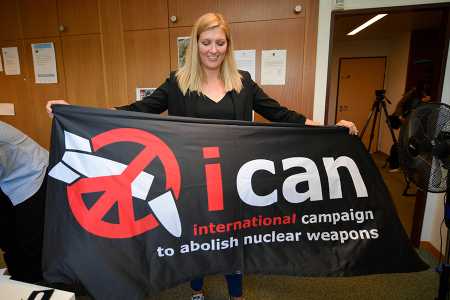"I find hope in the work of long-established groups such as the Arms Control Association...[and] I find hope in younger anti-nuclear activists and the movement around the world to formally ban the bomb."
ICAN Wins Nobel Peace Prize
November 2017
By Alicia Sanders-Zakre
The International Campaign to Abolish Nuclear Weapons (ICAN) was awarded the 2017 Nobel Peace Prize for its long-standing work to call attention to the catastrophic humanitarian consequences of nuclear weapons use and its integral role in the adoption of the landmark Treaty on the Prohibition of Nuclear Weapons.
“It is the firm conviction of the Norwegian Nobel Committee that ICAN, more than anyone else, has in the past year given the efforts to achieve a world without nuclear weapons a new direction and new vigor,” the Norwegian Nobel Prize Committee stated.

ICAN, a coalition of 468 nongovernmental organizations in more than 100 countries, has pushed for a legal ban on nuclear weapons for a decade. The organization was thanked repeatedly by leading negotiating states on the prohibition treaty for its persistent efforts to bring the accord to fruition, including by the chair of the negotiations in remarks following the treaty’s adoption July 7. (See ACT, October 2017.)
“[T]he courage it took for a bunch of activists to pursue an idea through to international law, despite being stripped of funding and at times dignity, and the courage it took for 122 governments to stand up to the power of the bomb wielded by a handful of aggressive, warmongering governments, is what reflects the best of humanity and the most promise for our future as a species,” wrote Ray Acheson, director of Reaching Critical Will and a member of the ICAN steering committee, in an Oct. 9 editorial.
Following the award announcement, ICAN credited the “many millions of campaigners and concerned citizens worldwide” who helped achieve the treaty’s adoption, singling out for special note the survivors of the Hiroshima and Nagasaki bombings, the hibakusha, “whose searing testimonies and unstinting advocacy were instrumental in securing this landmark agreement.”
Japan, while opposing the prohibition treaty despite the hibakusha’s central role in advocating for it, welcomed the increased awareness of disarmament and nonproliferation that could result from the prize. “Although ICAN’s activities to date are different from the Japanese government’s approach, we share the goal of eliminating nuclear weapons,” Japanese Foreign Ministry Press Secretary Norio Maruyama said in an Oct. 8 statement.
ICAN drew congratulatory comments from representatives of dozens of states meeting in the UN General Assembly First Committee, from countries that attended the nuclear prohibition treaty negotiations to a few that had boycotted them.
All nuclear-armed states and most NATO members boycotted the prohibition treaty negotiations, meaning the accord will have little immediate impact on existing nuclear arsenals. (See ACT, November 2016.) The Nobel committee acknowledged that the treaty will not “in itself eliminate a single nuclear weapon,” but said that it does fill a “legal gap” as the first prohibition of nuclear weapons.
The award not only is prestigious recognition of ICAN, but also is intended to be what the Nobel committee said is a “call” on nuclear-armed states in particular to begin “serious negotiations” to eliminate nuclear weapons.
“I therefore hope this prize serves to inspire new momentum, dialogue and serious efforts by the international community to pursue disarmament as a means for preventing conflict, reducing international tensions and achieving sustainable peace and security,” said UN High Representative for Disarmament Izumi Nakamitsu in an Oct. 6 statement.
For its part, ICAN intends to use the Nobel Prize to achieve greater treaty adherence. “We hope the Nobel Prize will help us in our campaigning to get countries to sign and ratify this vital agreement,” Tim Wright, campaign director of ICAN Australia, said at an Oct. 9 press conference.
Fifty-three states have signed the treaty since it opened for signature Sept. 20, and three—Guyana, the Holy See, and Thailand—have ratified it. An additional 47 states will need to ratify the treaty for its entry into force.—ALICIA SANDERS-ZAKRE
Nobel Peace Prize The Nobel Peace Prize has been awarded 98 times to 131 Nobel laureates—104 individuals and 27 organizations—between 1901 and 2017. This is the sixth time since 1985 that the Norwegian Nobel Committee has recognized organizations and individuals for their disarmament work. Past winners include:
|
